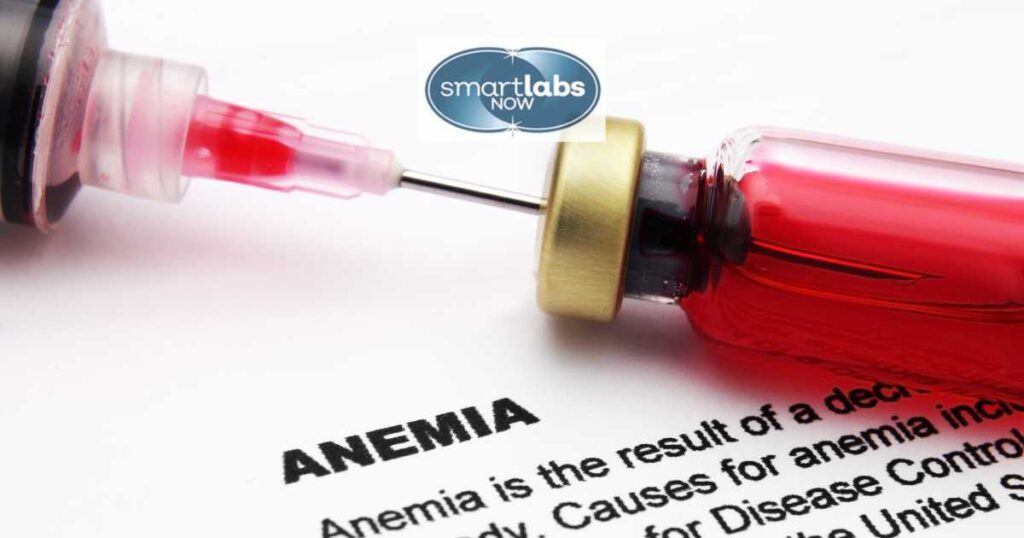
Blood tests are crucial tools for evaluating our health. Among these tests are those that measure Mean Corpuscular Hemoglobin/MCH and Mean Corpuscular Hemoglobin Concentration/MCHC. Though these terms might seem complex, understanding them is essential for diagnosing several health conditions.
Simply put, MCH reflects the average amount of hemoglobin in a red blood cell, while MCHC measures the concentration of hemoglobin within a given volume of red blood cells.
These two metrics provide valuable insights into the oxygen-carrying capacity of your blood, which is critical for overall health. Abnormal MCH or MCHC levels can signal several common diseases and health concerns, making them essential markers in routine blood tests.
For a deeper dive into understanding these tests, we recommend checking out our “MCH & MCHC Blood Tests: Everything to Know” guide 🤓.
The significance of these tests (and CBC diagnostics, by extension) becomes clearer when we connect them to specific ailments.
Let’s explore how these markers help diagnose various health conditions, including anemia, thalassemia, liver disease, alcohol abuse, pregnancy-related complications, and leukemia.

Anemia is a condition characterized by a lack of healthy red blood cells, leading to reduced oxygen flow to the body’s tissues. The symptoms of anemia—such as fatigue, dizziness, pale skin, and shortness of breath—are often subtle but can worsen if untreated.
Several types of anemia can be identified by analyzing MCH and MCHC levels:
– Iron-Deficiency Anemia: This is the most common type of anemia and occurs when the body lacks enough iron to produce hemoglobin. In this case, MCH and MCHC levels are typically low. A blood test showing low MCH can point to iron deficiency, prompting further investigation.
– Vitamin B12 Deficiency Anemia: Vitamin B12 is essential for red blood cell production. A deficiency leads to larger red blood cells that carry less oxygen, resulting in higher MCH values. MCHC may remain normal or slightly elevated. Identifying elevated MCH levels can direct attention toward nutritional deficiencies.
– Folate Deficiency Anemia: Folate, another essential B vitamin, plays a crucial role in red blood cell formation. Similar to B12 deficiency, folate deficiency anemia causes red blood cells to enlarge, resulting in higher MCH levels. This can alert doctors to investigate folate levels as a potential cause.
In each of these cases, MCH and MCHC values help differentiate between types of anemia, making these tests key to understanding the underlying cause.
The prognosis for individuals diagnosed with anemia through a low MCHC (Mean Corpuscular Hemoglobin Concentration) test is often positive, as many forms of anemia are minor and can be effectively managed. For those with anemias that are chronic, lifelong management is usually possible through controlled medication and dietary adjustments.
The MCHC test plays a crucial role in evaluating the type and intensity of anemia. It helps physicians pinpoint potential causes by measuring the concentration of hemoglobin in a given volume of blood. While merely detecting low hemoglobin might indicate anemia, healthcare providers consider a range of factors to tailor treatment plans. These include the patient’s overall health, age, lifestyle, and any concurrent medical conditions.
By addressing these diverse considerations, healthcare providers aim to create a comprehensive treatment approach that enhances quality of life and manages symptoms efficiently.

Thalassemia is a genetic blood disorder that affects the body’s ability to produce hemoglobin. There are several types of thalassemia, including alpha and beta thalassemia, each with its unique presentation. These disorders are more common in individuals of Mediterranean, African, and Southeast Asian descent.
MCH and MCHC tests are essential for diagnosing thalassemia.
In this condition, MCH and MCHC levels are often markedly low, especially in beta-thalassemia. These low values signal that the red blood cells are smaller than usual and contain less hemoglobin. As a result, thalassemia causes severe fatigue, pale skin, and general weakness.
By pinpointing abnormalities in MCH and MCHC levels, doctors can determine whether further genetic testing is required for a confirmed thalassemia diagnosis.

The liver plays a crucial role in managing various blood components, including red blood cells. When the liver isn’t functioning properly due to conditions such as cirrhosis or hepatitis, red blood cell production and lifespan can be affected.
MCH and MCHC tests are often part of a broader evaluation of liver function.
In liver disease, abnormal MCH and MCHC levels can indicate irregular red blood cell production, with MCH levels sometimes elevated due to enlarged red blood cells. Monitoring these values can help doctors assess the severity of liver disease and its impact on blood health.
Specific patterns, such as elevated MCH with normal or slightly reduced MCHC, can be a red flag for liver disease, prompting further liver function testing.

Chronic alcohol consumption takes a toll on the entire body, including the blood.
Excessive alcohol intake can lead to deficiencies in key nutrients like vitamin B12 and folate, both of which are critical for red blood cell production. This leads to a type of anemia commonly seen in individuals with a history of alcohol abuse.
MCH and MCHC tests can reveal alcohol-induced anemia by showing an increase in MCH levels, while MCHC might remain normal. Higher MCH levels point to larger red blood cells, a condition known as macrocytosis, often associated with alcohol abuse.
These patterns in the blood are among the early signs of the body’s reaction to excessive alcohol consumption, even before more obvious liver damage (sometimes a prelude to cancer) sets in. The insight these tests provide is vital for early intervention and counseling on reducing alcohol intake.

Pregnancy brings about a range of physiological changes, including alterations in blood volume and red blood cell production. As the body works to support the growing fetus, monitoring maternal blood health is critical to ensure both mother and baby are getting enough oxygen.
MCH and MCHC levels typically remain stable throughout pregnancy, although mild variations are normal. However, abnormal levels may indicate issues such as iron-deficiency anemia, which is common during pregnancy. Low MCH levels could signal the need for iron supplementation to avoid complications like fatigue, preterm delivery, or low birth weight.
It’s important to maintain healthy red blood cell levels to ensure a well-oxygenated environment for the baby’s development.
These tests are often included in routine prenatal checkups to monitor the mother’s blood health and catch any red flags early.

Leukemia is a type of cancer that affects the blood and bone marrow, causing the uncontrolled production of abnormal white blood cells. This leads to disruptions in the production of normal red blood cells, affecting their size and hemoglobin content.
MCH and MCHC tests can play a role in the diagnosis of leukemia. Abnormal MCH and MCHC levels, along with other blood markers, may raise suspicion of leukemia. Typically, MCH values may be elevated due to larger, less efficient red blood cells.
These anomalies, when combined with a complete blood count (CBC) and other tests, help doctors identify abnormal cell production and proceed with more specific diagnostic procedures like bone marrow biopsies.
By recognizing unusual patterns in MCH and MCHC results, healthcare providers can make critical decisions in diagnosing and managing leukemia, leading to earlier intervention and treatment.
Given the crucial role that MCH and MCHC levels play in diagnosing a range of conditions, it’s essential to know when these tests are necessary.
Symptoms like unexplained fatigue, weakness, paleness, or dizziness may warrant testing, as these can be signs of anemia or other underlying issues. If you have a family history of blood disorders, such as thalassemia, regular monitoring of your red blood cell health may be advised. Additionally, individuals with liver disease, heavy alcohol use, or pregnancy-related concerns should keep an eye on their blood health.
Healthcare providers often include MCH and MCHC testing as part of a routine health checkup or when investigating specific symptoms. These tests are especially recommended if you’re experiencing symptoms of anemia or if you fall into a higher-risk category due to lifestyle factors or pre-existing conditions.
Consulting a healthcare provider for personalized advice is essential, as they can interpret the results and guide you on the appropriate course of action.

Low MCH levels can lead to various symptoms, including consistent tiredness, dizziness, pale skin, weakness, and shortness of breath. Easy bruising is another common sign of low MCH, which can be indicative of anemia. If you’re experiencing these symptoms, it’s important to seek medical advice for proper diagnosis and treatment.
A balanced diet is crucial for raising MCH levels, which are a measure of red blood cell size. Essential nutrients like folate, vitamin B12, and vitamin C play a vital role in iron absorption. Consuming iron-rich foods, such as lean red meat and leafy green vegetables, can significantly boost MCH levels. In severe cases, iron injections or iron-rich blood transfusions may be necessary.
High MCH levels, often associated with macrocytic anemia, can cause a variety of symptoms. These include fatigue, pale skin, brittle nails, and poor concentration. In more severe cases, individuals may experience brain fog, confusion, memory loss, and a fast heartbeat. It’s important to consult with a healthcare professional if you’re experiencing these symptoms, as they may indicate underlying health issues.
High MCH levels can be indicative of various conditions, including megaloblastic anemia. Reducing caffeine intake and making dietary adjustments to increase fiber and folate levels can help lower MCH. Ensuring adequate vitamin B12 and vitamin C intake is also important for maintaining healthy red blood cell production.
If underlying conditions like malabsorption or nutrient deficiencies are contributing to high MCH, addressing these issues is essential.
Mean Corpuscular Hemoglobin Concentration (MCHC) measures the average concentration of hemoglobin within a given volume of red blood cells. It’s an important metric for diagnosing and managing various health conditions, particularly those related to anemia.
Typically, the standard MCHC range is between 32 and 36 grams per deciliter (g/dL). However, remember that exact reference ranges can vary slightly between different laboratories due to variations in equipment and analysis techniques.
Elevated MCHC levels can indicate a condition known as hyperchromia, where red blood cells contain an unusually high amount of hemoglobin. This could be a sign of certain types of anemia, such as hereditary spherocytosis or sickle cell anemia.
Conversely, low MCHC levels might point to hypochromia, characterized by insufficient hemoglobin in the red blood cells. Conditions such as iron-deficiency anemia or thalassemia can cause these reduced levels.
When your MCHC (Mean Corpuscular Hemoglobin Concentration) is lower than normal, it can be a reason for concern. This blood test metric often highlights specific health issues, such as iron-deficiency anemia. But what does this mean for your overall health?
Low Mean Corpuscular Hemoglobin Concentration (MCHC) is commonly observed in certain types of cancer. Here’s a breakdown of these associations:
Understanding these connections can provide insight into the complex interactions between different cancers and blood health. Awareness of these factors is crucial for managing and diagnosing cancer-related anemia.
If your MCHC levels fall outside the typical range, it’s crucial to consult with a healthcare provider. They can determine if further diagnostic testing is needed to pinpoint the underlying cause and recommend the appropriate treatment.
In conclusion, while slight variations in MCHC might not be alarming, significantly high or low readings should be evaluated by a medical expert for a comprehensive assessment.

MCH and MCHC tests are powerful tools for understanding your blood health. From diagnosing different types of anemia to identifying genetic disorders like thalassemia, monitoring liver function, and even detecting early signs of alcohol abuse or leukemia, these tests offer valuable insights into how your body is functioning.
If you’re experiencing symptoms like fatigue, weakness, or unusual paleness, or if you’re at risk due to alcohol use, pregnancy, or liver conditions, it might be time to get your levels checked. Early detection can make all the difference in managing your health.
To take control of your blood health, we encourage you to book our “Comprehensive Blood Chemistry” panel, which includes both MCH and MCHC testing. Understanding your body starts with understanding your blood.
Please consult your primary care physician before engaging with any pharmaceutical, natural substances, or activity regimens mentioned or prescribed in this post. Smart Labs Now is not responsible for any health or life outcomes resulting from the use of the information or recommendations provided. This account does not serve as a substitute for professional medical advice.